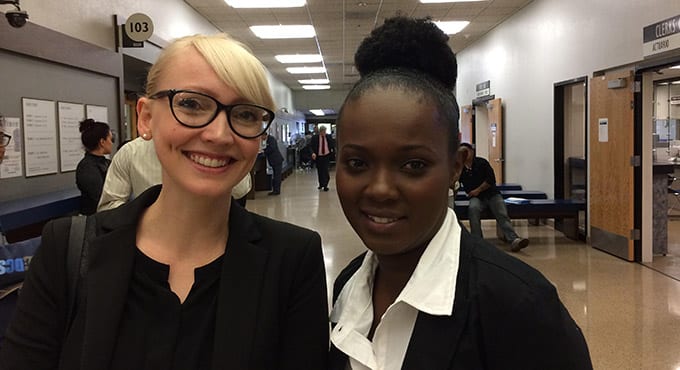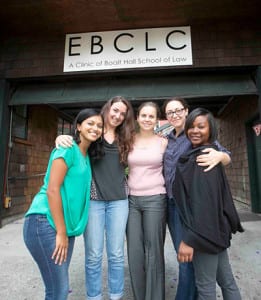
By Andrew Cohen
In April 2005, the East Bay Community Law Center (EBCLC) hosted a “Clean Slate Summit” at Laney College in Oakland. Organized by EBCLC leaders Tirien Steinbach ’99 and Margaret Richardson ’03, the event drew more than 900 people—twice the expected attendance—who wanted to work but faced major barriers to employment because of their criminal records.
Back then, Eliza Hersh ’05 was an aspiring public interest attorney on the verge of graduating from Berkeley Law. Today, she directs the Clean Slate Practice, which EBCLC launched soon after that memorable gathering. Now celebrating its 10-year anniversary, Clean Slate has achieved enormous success wiping away criminal records, while fighting an uphill battle amid staggering incarceration rates in California—particularly among people of color.
“Over the last decade, through close collaboration with our community partners who are directly impacted by reentry policies, Clean Slate has evolved to both better serve our clients and engage in systems-change work,” Hersh said.
The practice has served nearly 10,000 low-income people in the Easy Bay, trained more than 150 law students in providing reentry legal services, and forged a strong network of area and national partners. In doing so, Clean Slate’s innovative approach has generated hope for formerly incarcerated people who are eager to become productive citizens.
Danica Rodarmel ’17 recently helped a Clean Slate client prevail in a hearing to seal and destroy an arrest record on the basis of factual innocence. Rodarmel argued on behalf of the client, a domestic violence survivor, and drafted the winning motion with Jenna Raspanti ’17.
“Working with Clean Slate for the last year has been life changing,” said the client, who asked to remain anonymous, via text. “Under Eliza’s supervision, the students always kept me in the loop regarding my court hearing and made it a smooth process. As I now pursue a nursing career, I’m hopeful about the future. I’m so grateful to Clean Slate for all the good work it does for the community.”

Rodarmel believes that “nothing is more important for law students interested in doing criminal justice work than to get out of the classroom and connect what we’re learning to the real world. A legal education in itself isn’t sufficient to learn how to do this work. In reality, the issues we learn about in class come from human stories and legal decisions that impact people in our community.”
Power of partnership
In 2013, Clean Slate formed a groundbreaking reentry partnership with the Alameda County Public Defender’s Office. Together, the organizations help clients overcome barriers not only to employment due to arrests and convictions, but also to housing, education, public benefits, and civic participation.
According to Alameda County Defender Brendon Woods, this innovative collaboration is providing “more services, better services, to more people to help them overcome the collateral consequences of conviction.” With deputy public defenders developing expertise in crafting dispositions that mitigate the impact of those consequences, Woods said “this improves outcomes for our clients, their families, and our community.”
The partnership’s first year saw over 600 motions filed—and a 93-percent success rate in helping people clear up their records. Clean Slate’s staff works closely with the Public Defender’s Office to reduce felonies to misdemeanors for qualifying offenses, gain early termination of felony or misdemeanor probation, and obtain dismissals when probation is completed. They also focus on sealing arrest records when a client is proven innocent, correcting errors on criminal background reports, and redressing unlawful employment discrimination on the basis of conviction history.
“There’s no other model for this collaboration in the country,” Hersh said. “Joining forces this way expands the scope of our collective services, which are badly needed in this area. Given the volume of need, we have to be efficient and innovative to maximize our effectiveness. Bringing reentry services into the public defender’s office helps more people get back on their feet, and gives public defenders the tools they need to consider collateral consequences of conviction at the time they resolve cases.”
Impact litigation and advocacy
Clean Slate continues to expand its impact litigation work around criminal record reporting, race discrimination, and consumer protection for people with criminal records. Racial Justice Senior Fellow Sarah Crowley leads this effort, coordinating with a team of pro bono lawyers to confront various injustices.
“Rather than fighting these issues solely on a case-by-case basis, we’ve worked to expand our litigation that strives to improve ongoing practices more broadly,” Hersh said. “If we don’t challenge systemic barriers for people with criminal records, we won’t see the kind of progress our clients and our society need.”
Clean Slate also assists people denied professional licenses based on their criminal record—often a major impediment to their remaining self-sufficient. Led by Tanya Koshy ’10, this work includes representing clients in their appeals and policy advocacy to broaden the rights and protections for people with records.
“We just helped one woman who had a 1992 simple battery misdemeanor conviction for a fight during high school,” Hersh said. “She was denied a license to become a school bus driver even though she had never been arrested since. You can’t expect people to reenter society and become productive citizens by putting up that kind of roadblock.”
The path ahead
Clean Slate has engaged in other successful campaigns that tackled areas such as civic engagement, juror enfranchisement, and juvenile reentry. Crowley and fellow Clean Slate staff member Alex Bender wrote a recent article in the The Atlantic chronicling how many job applicants—particularly people of color—are rejected based on background checks that are irrelevant or even inaccurate.
The article describes how consumer-reporting agencies routinely link a crime with the wrong person based on name similarity, incorrectly report an old offense as recent, or mistake the severity of an offense. Helping people with records correct those wrongs, among the many other obstacles they face, motivates Hersh to make Clean Slate’s next 10 years even more productive.
“We’re lucky to have talented and committed students expand the capacity and impact of our work,” she said. “There aren’t many opportunities for students in a clinical setting to do criminal justice-focused civil litigation, and our students are excited for that opportunity. Because ours is such a high-volume practice, our students can also get a lot of court experience.”